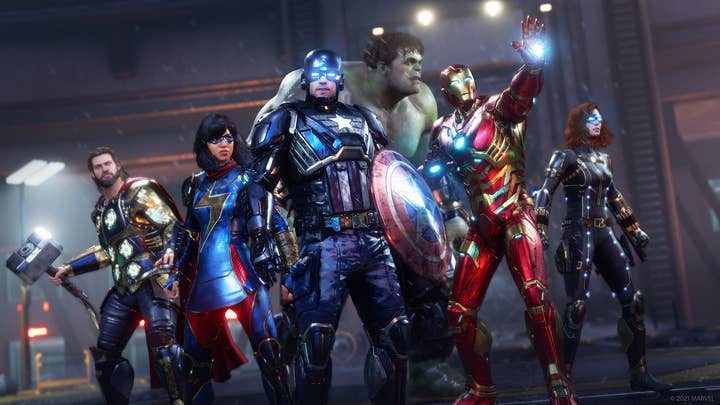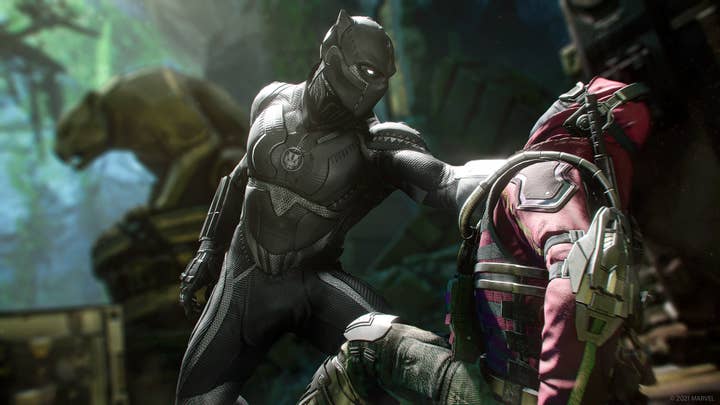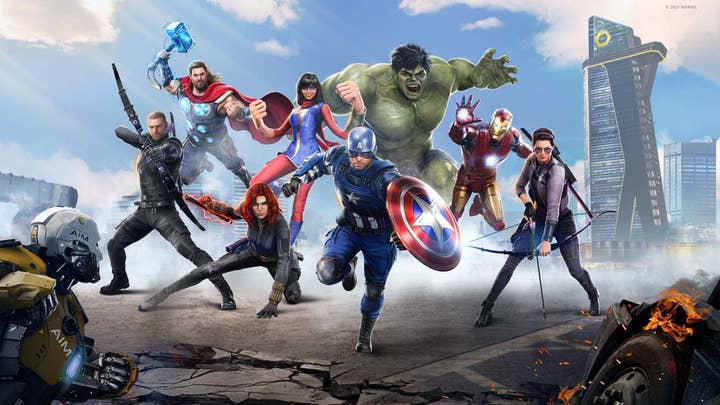Can Marvel's Avengers find long-tail success on Game Pass? | Opinion
Square Enix' game met a lukewarm reception despite its world-class IP -- now its arrival on Game Pass highlights the opportunity for games to outlive disappointing launches
It's become such a given that most people hardly think about it any more -- but even with the benefit of over a year of hindsight, the collective shrug that greeted Marvel's Avengers remains one of the most extraordinary things to happen in the games industry in recent years.
A game based on arguably the most popular IP in the world right now, whose most recent cinematic outing had become the biggest-grossing movie in history only a year previously; a game by a hugely respected developer, backed by a major publisher, and launching, no less, in the midst of a once-in-a-century pandemic that had driven consumption of home entertainment generally and games in particular to new heights.
And yet, even after word of mouth started to warm up over the game's solid single-player story campaign, the gaming public's reaction barely scaled the dizzying heights of "meh" before simmering down to "oh yeah, that's a thing that exists."
There's undoubtedly value in poring over exactly what happened to the launch of Marvel's Avengers and how such an extraordinary opportunity was squandered.
At a guess, the writing was pretty much on the wall from the moment that the undoubtedly eye-watering cost of the license demanded a focus on the kind of online play that's good at squeezing IAP transactions out of players, but bad at doing what people actually want from Marvel characters, which is stories and characterisation.
However, the story of Marvel's Avengers didn't stop at its unexpectedly unimpactful launch. In the subsequent year, Square Enix has continued to stand behind the game with continued promotion and development of content -- either due to genuine faith in the game from management, or to contractual obligations, or perhaps to a little bit of both.

Either way, this is a marked contrast from abandoned titles like EA and Bioware's Anthem, although it's arguably also somewhat unfair to put Avengers, which at least had an enjoyable single-player story mode and only really started to lose players' interest quite a few hours in, in the same bracket as the fundamentally broken Anthem.
Nonetheless, it's an interesting example of a publisher standing behind an online game after a tough launch; and this week saw the next step for Marvel's Avengers, with its launch on Xbox Game Pass, whose subscribers will get access to the game complete with all of the various DLC and content packs that have been added to it since its launch last August.
Something along these lines isn't unusual for online titles that have stumbled at launch, of course; sometimes those titles just get canned early in their lifecycles.
But during the era when every studio and their aunties thought they were going to make the next World of Warcraft, the tendency was for premium MMOs that flopped (i.e. most of them) to retool their monetisation systems and in-game economies around F2P if subscription revenues didn't make the grade after a year or so.
Subscription game services offer an interesting alternative to F2P for games which need a shot in the arm to rise above a tough launch
This worked in some cases, although in most it just prolonged the inevitable demise of the game -- while also helping to tar F2P games with an unhelpful "this is where failed premium games go to die" brush.
Here in 2021, though, subscription game services offer an interesting alternative to F2P for games which need a shot in the arm to rise above a tough launch and aren't likely to get it from players paying up-front.
Sony's PS Plus and Microsoft's Xbox Games Pass both offer companies an opportunity to set out their game's stall to consumers after it has been patched, updated, and expanded into a more interesting state.
Of the two, PS Plus is the more selective, since it's quite a different model to Game Pass (with a limited number of monthly game slots) and would arguably devalue its own service offering by putting a game with an existing poor reputation into one of its high-profile monthly positions.
For Xbox Game Pass, however, it's absolutely no skin off Microsoft's nose to put almost any game at all on its expansive service -- and for a game which might still have a large audience of people who are cautiously interested, this represents a huge opportunity.

I don't want to imply here that this is some kind of last-chance saloon for Marvel's Avengers; given the strength of the IP and the generally positive reception to the most recent Black Panther DLC, it's possible that Square Enix could actually claw its way back (no pun intended) to some kind of decent following for the game.
Game Pass, however, offers an interesting new opportunity for these kinds of games to reach an audience that might otherwise be locked off to them -- consumers who are potentially curious about the game (it's still one of the biggest IPs on earth, after all) but turned off by its initial bad word-of-mouth, and cautious about spending any money up front as a consequence.
Game Pass [is] also starting to offer a realistic opportunity for games that fail to meet expectations at launch to instead enjoy long-tail success
This was the logic of shifting underperforming MMOs over to F2P models for many years; but Game Pass is arguably a much more elegant and effective solution to the problem. Its monetisation is complex and much appears to be down to individual publisher contracts, but at its core it seems to be based on dividing up a pre-existing subscription between companies whose games are being actively played on the service.
Thus, it demands far less reworking of an existing premium game, if any at all; companies simply eschew the up-front payment, dropping the game as-is onto the service and earning a revenue stream without having to go through a difficult (and potentially game-breaking) retooling of the game's economy and business systems.
The broader point here reaches far beyond the specific case of Marvel's Avengers -- it's that services like Game Pass, alongside many other impacts that they're starting to have on the industry, are also starting to offer a realistic and very welcome opportunity for games that fail to meet expectations at launch to instead enjoy long-tail success.
If this kind of opportunity for games has echoes of anything, it's of the opportunities that developed for movies which initially underperformed at the box office before finding a receptive audience on home video or DVD.
The Shawshank Redemption is perhaps the most famous case of that, and while I don't think Marvel's Avengers is going to be joining Shawshank on any lists of classics any time soon, the hope is that services like Game Pass might open up a similar long tail opportunities for many other games as well.
If nothing else, the existence of this kind of opportunity might make publishers less likely to drop games like Anthem so quickly after a poor launch reception; in taking some of the pressure off the narrow launch window, subscription game services might just give a wider variety of games a chance to find both their feet and their market.

